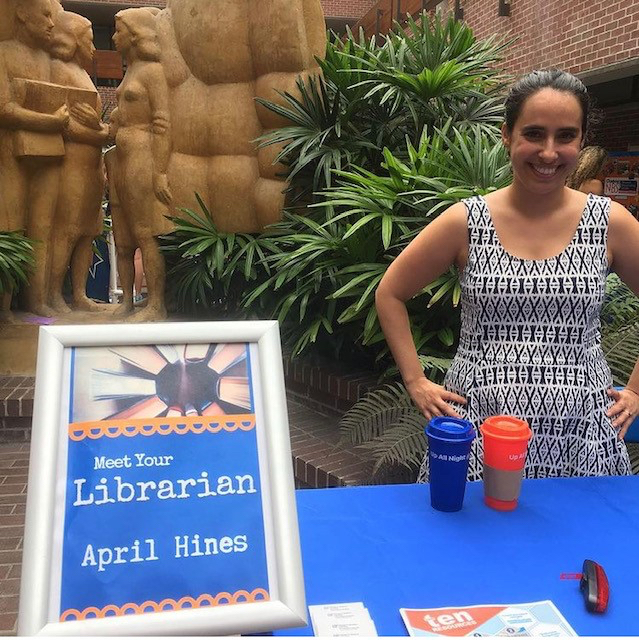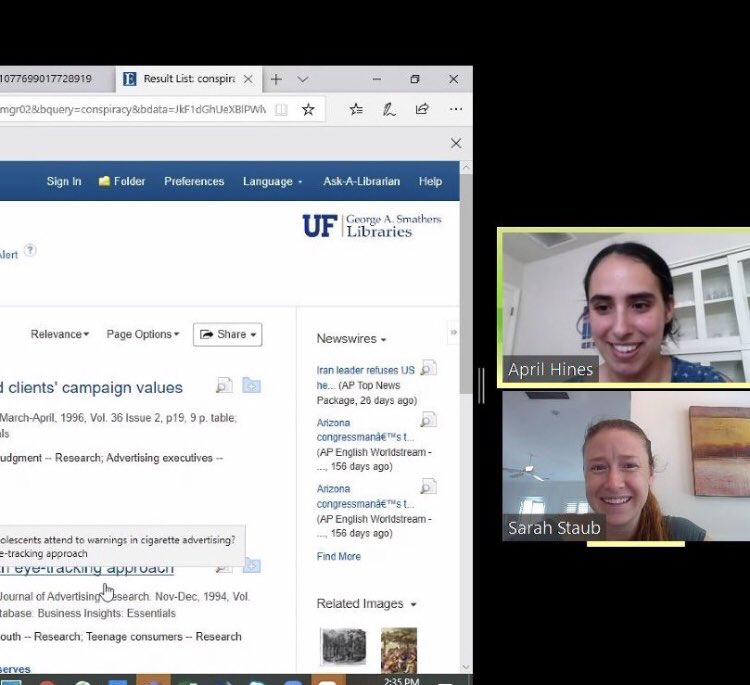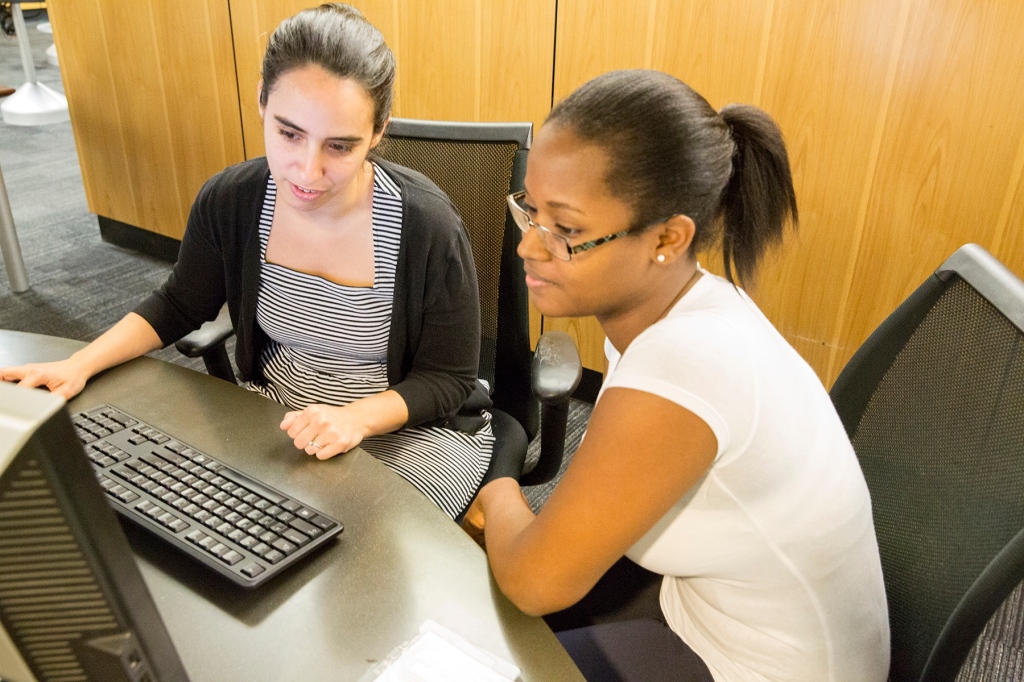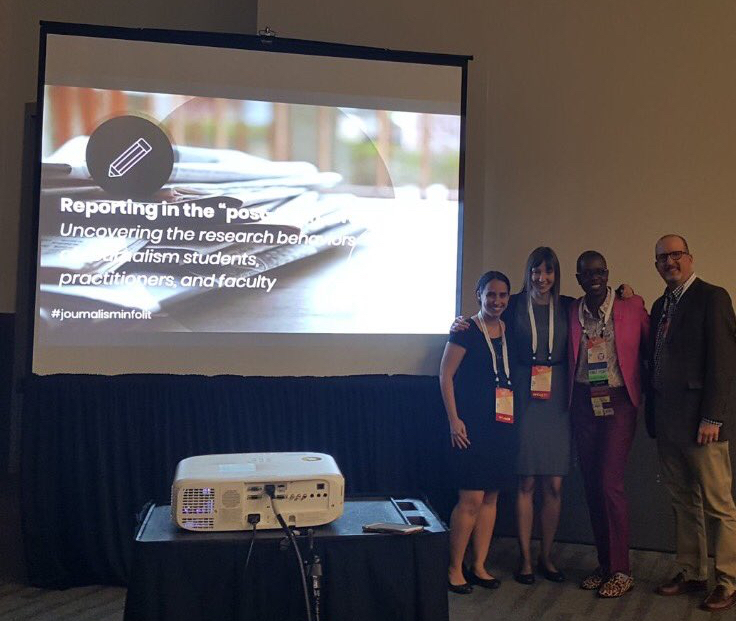When you design a new course or update a course you’ve previously taught, consider talking with your librarian to help identify course resources.

I asked April Hines, librarian for the University of Florida College of Journalism and Mass Communications, to share insights about the work of librarians and how librarians can enable faculty to utilize Open Educational Resources (OER) to provide up-to-date, free course materials for students.
Hines is chair of the Education and Behavioral Sciences Section (EBSS) of the Association of College & Research Libraries (ACRL), a division of the American Library Association (ALA). She earned a bachelor’s degree in Journalism from UF and a master’s degree in Library and Information Science from the University of South Florida.
Faculty often think campus librarians are solely focused on helping students who are in the library. What are some of the ways you are involved in helping faculty?
April Hines: Much of my work happens beyond the physical library space – especially during COVID-19. Faculty will often ask me to be a guest speaker in their classes (either in person or virtually) to teach specialized research skills or to discuss topics related to information or media literacy.
I always try to tie my instruction to the curriculum and have taught everything from how to locate business and consumer info for advertising and public relations classes to how to search news archives for student journalists to how to develop a scholarly literature review for graduate students.
I have met one-on-one with faculty for consultations when they are trying to identify appropriate resources and search techniques before they start their own research. I also have worked alongside faculty on larger grant-funded projects that are interdisciplinary.
I even curate online research guides that instructors can embed into their courses, and I, of course, work with faculty to purchase the books, journals and databases they need for their work whenever possible.
One of your interests is helping faculty develop course materials that reduce or eliminate entirely the cost of course materials for students. Can you explain the resources that are available for faculty, such as open educational resources (OER) and library-licensed resources as well as free online materials?
April Hines: Helping instructors locate open educational resources (OER) and library licensed materials to replace costly textbooks is a big passion of mine.
I have had students contact me, frantically wanting to know if the libraries own their textbook because they cannot afford to purchase it on their own. Or others have shared they purchased an expensive book, only to use a few chapters throughout the semester.

I think many instructors would be surprised to learn how many options are available to them when it comes to freely available and high-quality educational materials for their classes.
There are OER repositories, such as OER Commons and Open Textbook Library , that pull together open course materials created by experts, and more materials are being added every day. Some of these materials are produced through grant funding or are crowd-sourced by a variety of scholars, and many come with reviews.
There are also library resources that instructors can link to on their course site that, while not free to the libraries, are completely free to students. For example, I recently met with an instructor who was looking to revamp her course readings, and, after we discussed her learning objectives, I was able to help her locate related journal articles, case studies and streaming videos from our databases as well as e-books from our library catalog.
I also explained she could request a book chapter or selection scan from a physical book in the library (usually around one chapter or 10% of the total work due to copyright restrictions) and have it uploaded to our electronic course reserves system.
At the end of the session when I mentioned I hoped these resources would be helpful, she said, “Yeah, I don’t know why I would even need a textbook now.” That really made my day!
If an instructor was interested in developing course materials, what is the process and how does the instructor collaborate with a campus librarian?
April Hines: It is great when instructors contact their liaison librarian at least the semester before the semester they are planning. This allows time for materials to be purchased if necessary (if funding is available) or for items to be scanned for course reserves.

When instructors contact me about developing course materials, I will ask them to send me their syllabus so I can become more familiar with the course goals and objectives.
This gives me the opportunity to do some searching on my own and have a prepared list of materials that I think would be good for the class.
From there we will schedule a meeting, usually virtually, where we will discuss their course needs in more detail and dive into various resources together, searching for related content as I explain what is available to them and their students. In my experience, these sessions usually involve an instructor saying “Wow, I had no idea I had access to all of this!” at least once.
What are the advantages of such course materials for instructors? For students?
April Hines: OERs and library resources allow instructors to create more customized and timely course materials. They can pull from a variety of media and format types – academic research, trade articles, streaming video, news articles etc. – while also including a scanned chapter or selection from a textbook that they really do feel is effective. They do not have to feel stifled or boxed in by a particular textbook’s limitations.
For students, materials such as these can feel more relevant and engaging, and, of course, because they are freely available, they can put their energy into learning rather than stressing about how they are going to pay for expensive course materials.
Unfortunately, according to the Bureau of Labor Statistics, college textbook prices have increased by 88% since 2006, In Florida, students who receive Bright Futures Scholarship funding from the state have now lost their textbook stipend due to cutbacks.
What was your process of becoming a University of Florida librarian? I know you were a student assistant in UF’s Education Library during your junior and senior years at UF.
April Hines: Much of my path to librarianship involved being in the right place at the right time.
I grew up going to the public library nearly every weekend with my mother, so it was no surprise that I ended up in a work study student assistant position at the UF Education Library when I was in college.
After I graduated with my journalism degree in 2004, I was a magazine journalism major at a time when the magazine industry was changing dramatically, and full-time writing positions were scarce. So, I took what I thought would be a temporary position as a circulation assistant at the UF Law Library.
It was there that I had an epiphany. The reason I always ended up back in libraries was because I truly loved libraries, and I was still disseminating information, just in a different way.
Some of the librarians I worked with encouraged me to get a master’s degree in Library and Information Science from the University of South Florida, which I did online while working in the UF library system full-time. A few years after I finished my MLIS degree, the journalism librarian position opened, and it really felt like “this is my one shot.”
That was the perfect full-circle moment that brought together all my education and years of experience. I was offered the position in 2013 and have been here ever since. I really do love my job and am thankful that life brought me here.

How does being a graduate from UF’s College of Journalism and Communications and being a first-generation college student help you be a more effective librarian for the College?
April Hines: As a first-generation college student who relied heavily on financial aid, I remember choosing classes based on which ones had the least expensive course materials. I also lacked guidance and support during my first few years of college and really was not sure where to even turn for help.
High school was easy for me, but college was a different story, and it took a while to figure out things like time management and good study habits. I also had to work part-time while I was in school and was always worried about money, which made it difficult to focus on my classes.
Also, as a J-school student, while I loved my classes and instructors, I certainly was not a superstar student. I struggled because of many of the reasons above. For example, I did not have a car and had to walk or take the bus (no Uber back then!) while covering stories for my Reporting class. I got a C in Reporting but am now invited to Reporting classes as a guest speaker to teach research skills, which is crazy to think about now.
So, I feel like I can relate to other first-gen students on many of these levels, because I have been there.
I know what it is like to feel overwhelmed by the hugeness of college life. I also know what it is like to be a student in the UF J-school, and I have sat in some of the very same classrooms that today’s students sit in. I have taken some of the same classes and done very similar assignments and projects.
Students often come to me when they do not feel comfortable talking to their professors, and I think it is because they know I have walked an untraditional path, but still made it through to the other side.
As a UF librarian, you are in a tenure-track position. What are areas of research you’re involved with?
April Hines: Many do not realize that at the University of Florida librarians have faculty status and are in tenure track positions. This is not the case at all academic libraries, but here we have the same publishing and service expectations that teaching faculty have.
Some of my research interests include strategic library marketing and outreach, and the information seeking practices of journalists.
For example, I have recently published a paper with colleagues on using visual anthropology methods to analyze student-generated social media photographs that were taken in our library spaces – and how we used those findings to better understand our users.
I am also currently working on another paper with a large team of journalism librarians from around the country where we sought to uncover the research behaviors of journalism students, practitioners, and faculty after conducting over 50 interviews nationwide.
I have presented at library conferences at the state, national and international levels, and am currently chair of the Education and Behavioral Sciences section of the Association of College and Research Libraries.
You can follow April Hines on Twitter and learn more about library resources, her work with faculty and students, and being the mother of two young sons. @UFCJCLibrarian


Really enjoyed reading this, Julie. Interesting to hear this librarian’s path to her current position and status. Thanks for sharing this.
Thanks! From your career of teaching at Michigan State, you know how many productive career paths our students take.